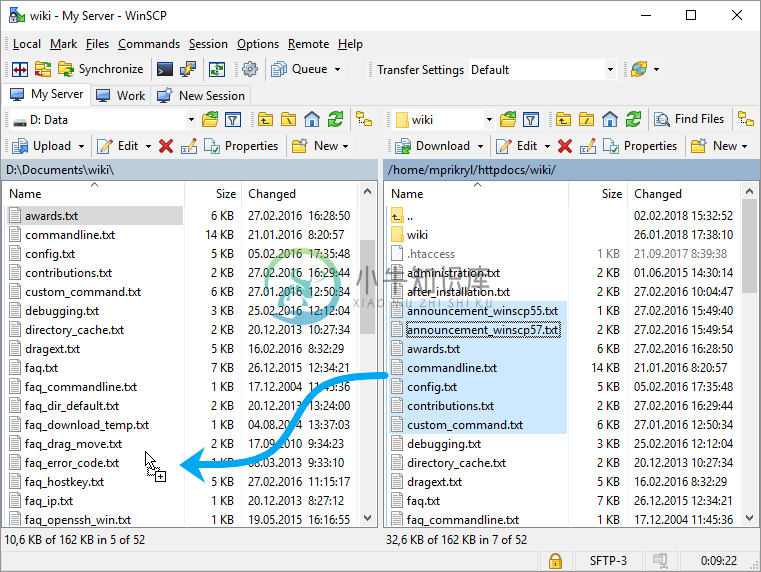Downloading Files
The simplest way to download files is to drag them from remote panel of WinSCP to local panel or Windows File Explorer. See section Using Drag&drop (Mouse).
For alternative ways, advanced options and automation see further sections.
First select the remote files or directories you want to download. You can select the files in the remote panel, either in file list or in directory tree (one directory only).
Then drag your selection and drop it on local directory.
If you are using Commander interface you can drop the files on its local panel. If you drop the files on empty place on file list, the files will be downloaded to current local directory.1 If you drop the files on local directory icon (either in the file list or directory tree), the files will be downloaded to that directory.
You can also drop the files to Windows File Explorer or other application. Possible external transfer destinations and the way they are handled depend on configured drag&drop download mode.
Before the download actually starts, the transfer options dialog will show. There you will have a chance to change the transfer options or the target directory. You can avoid the dialog being shown in preferences. In such case you can change the transfer options by selecting preset on Transfer Settings toolbar.
If you hold Shift key while dragging the files, they will be moved to local directory (i.e. transferred and deleted from remote directory).
If you prefer controlling application using keyboard, you will probably find Commander interface useful.
First select the remote files or directories you want to download. With Commander interface make sure that remote panel is still active. Then use File(s) > Download or corresponding keyboard shortcut.
Before the upload actually starts, the transfer options dialog will show. There you will have a chance to change the transfer options or the target directory. The target directory is by default the current local directory with Commander interface and the last used local directory with Explorer interface. You can avoid the dialog being shown in preferences. In such case you can change the transfer options by selecting preset on Transfer Settings toolbar.
If you use File(s) > Download > Download and Delete (or corresponding keyboard shortcut), the files will be moved to local directory (i.e. transferred and deleted from remote directory).
You can also download files using the Windows clipboard. First select the files you want to download in the remote panel and copy them to the clipboard.
Then use Paste command in the local panel (Commander interface only) or in Windows File Explorer.
Before the download actually starts, the transfer options dialog will show. There you will have a chance to change the transfer options. You can disable the dialog in preferences.
WinSCP can be registered to handle protocol URL Addresses. When it is, you can type in file URL to your favorite web browser or Window’s Start > Run box or even include the file URL to some web page. WinSCP will handle the URL and offers you to download the file.
By default the download starts on foreground, blocking the WinSCP window until it finishes. Learn how to schedule the background transfer.
To automate the file download, use the scripting command get or .NET assembly method Session.GetFiles.
You can also initiate a download from find results.
- You may consider turning off Full row select option to be able to drop files everywhere except directory files names to download them to current local directory.Back


